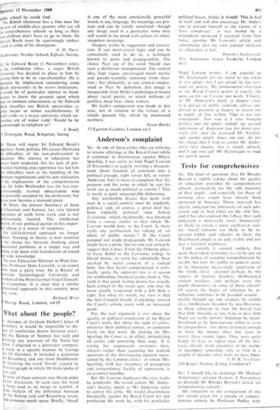Anderson's complaint
Sir: As one of those critics who are refusing to review offerings at the Royal Court while it continues to discriminate against Hilary Spurling, I was sorry to find Nigel Lawson (8 November) so eagerly twisting a disagree- ment about freedom of comment into a political crusade, right versus left, us versus Anderson. Isn't it naïve to complain that 'his purpose and the terms in which he sees his work are as much political as artistic'? This is surely a quite unacceptable dichotomy.
Any worthwhile drama that deals with man in a social context must be implicitly political, and, of course, a great deal has been explicitly political since before Lysistrata—which, incidentally, was financed from a source similar to that which Mr Lawson would deny to the Court. Is there really any justification for talking of 'an abuse of public money'? If the Court pumped out crude propaganda Mr Lawson might have a point, but no one can seriously suggest that it does. From the Osborne plays to Isaac Babel to the Lawrence trilogy to David Storey, its work has admittedly been marked by social concern of a radical bent: but that hasn't compromised it artis- tically (quite the opposite) nor is it reason for withholding financial grants from it. The truth is that good, lasting drama has usually been critical of the status quo, aria may be more readily associated with a left than a right. For what it's worth, my view is that the Arts Council should, if anything, reward the Court's artistic merit with an increased grant.
No, the real argument is not about the quality or political orientation of the Royal Court's work, but about the right of critics, whatever their political colour, to comment freely on that work. By picking on Mrs Spurling the Court is, in effect, intimidating all critics and censoring their copy. It is asking for acquiescent reviewers—PROS, almost—rather than accepting the wideish spectrum of the theatregoing opinion repre- sented by the London critics: of whom Mrs Spurling, with her sharpness of perception and extraordinary facility of expression, is an essential member.
But Mr Lawson duplicates the very faults he condemns. He would censor Mr Ander- son's theatre, much as Mr Anderson seeks to censor his critic. He would discriminate financially against the Royal Court for not producing the work he, with his particular political biases, thinks it should. This is bad in itself and will also encourage Mr Ander- son to present himself as the victim of a Tory conspiracy : as was shown by a triumphant postcard I received from him today, quoting Mr Lawson's article and announcing that my own journal 'declares its allegiance at last'.
Benedict Nightingale New Statesman, Great Turnstile, London wc 1 Nigel Lawson writes: I am grateful to Mr Nightingale for the stand he has taken in this affair, hut I am afraid he has mis- read my article. My fundamental objection to the Royal Court's action is exactly the same as his: as I wrote last week. 'Clearly, in Mr Anderson's book, a theatre critic is a species of public relations officer em- ployed to promote a theatre in return for a supply of free tickets. That is not our conception'. Nor was it I who brought politics into the affair: indeed, my second indictment of Anderson was for doing pre- cisely this—and the postcard Mr Nightin- gale quotes amply bears me out. As for the charge that I wish to censor Mr Ander- son's (sic) theatre, this is simply absurd, and I can only ask Mr Nightingale to read my article again.






































 Previous page
Previous page